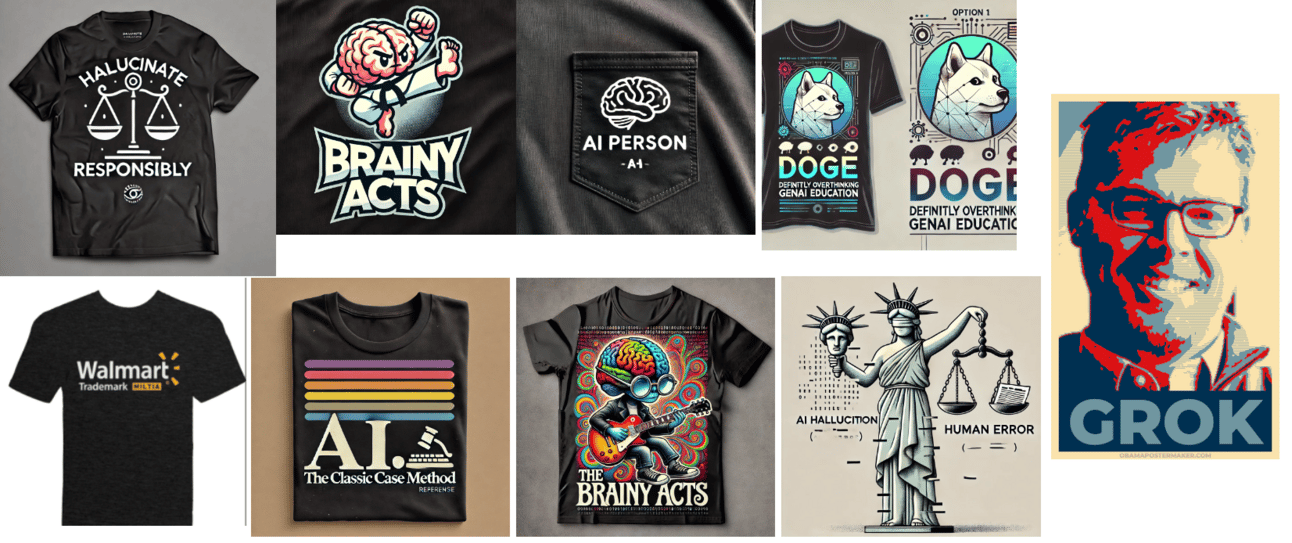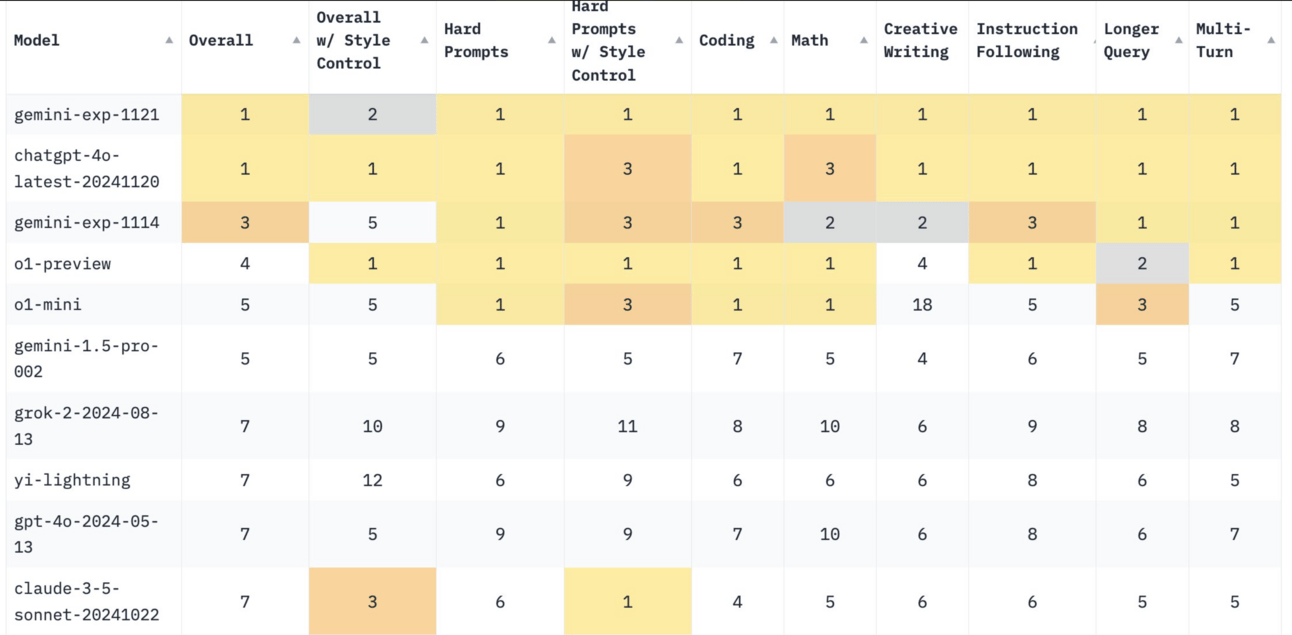
It’s Friday. Two milestones this week. One is that this is the 250th edition of Brainyacts - which is crazy. Huge thanks to all 6112 of you! The second is that yesterday I finished my first semester teaching at IU’s Maurer School of Law. I wanted to commemorate an awesome class of students and my first at the school so we had t-shirt design challenge. They were tasked with creating a t-shirt they would actually wear. Here is what they came up with in about 20 minutes - not bad! I thought the GROK one with the face of yours truly was joke (it still might be) but I was flattered nonetheless. I’ll share the winning and final design when its ready.

Onward 👇
In today’s Brainyacts:
Using GenAI in client interviews
We are in a pickle
Gemini & GPT40 keep advancing (maybe) and other AI model news
OpenAI destroys evidence in NY Times case plus more news you can use
👋 to all subscribers!
To read previous editions, click here.
Lead Memo
As regular readers know, I’ve been featuring insights from my students, showcasing their unique perspectives on navigating law and AI. Today’s contribution takes us into the mind of a law student preparing for their first client interview. It’s personal, funny, and authentically raw—giving a glimpse into the nerve-wracking reality of clinical practice. But beyond that, it offers a fresh take on how generative AI can serve as an unexpected ally in mastering the art of client interactions. From scenario generation to question trees, this piece reveals how AI can transform not just legal practice but the way we prepare for human connections.
The following was written by Matthew Shelton.
💬 😬 Leveraging Generative AI in Client Interviews
Last year in starting work at a clinic, I learned two things about client interviews: first, they're nothing like the neat practice scenarios from Professional Responsibility class. Second, they're absolutely terrifying.
Picture this: You’re sitting in our clinic's interview room, armed with a yellow legal pad and a script you have rehearsed a dozen times. Your first real client would arrive in ten minutes. You had the basic questions memorized: "What brings you here today?" "When did this issue start?" But your mind starts racing with all the things that could go wrong. What if I miss a crucial detail? What if I ask something irrelevant? What if I just... blank?
Spoiler alert: I did blank. The client started talking about a complex landlord dispute, and my carefully planned script went out the window. I scribbled notes frantically, trying to map out the relationships while maintaining eye contact and looking professional. Let's just say it wasn't my finest moment.
But here's where things get interesting. A few weeks ago, while reflecting on this experience, I remembered something from an article I read recently about a new AI product: AI isn't just for document review—it's also a powerful tool that can be used for interview preparation and client counseling.
Here’s what the article from Forbes said:
CodeSignal, an AI tech company, has launched Conversation Practice, an AI-driven platform to help learners practice critical workplace communication and soft skills.
Conversation Practice uses multiple AI models and a natural spoken interface to simulate real-world scenarios and provide feedback.
The goal is to address the challenge of developing conversational skills through iterative practice, without the awkwardness of peer role-play.
What I learned about this software changed my perception about how I can prepare in the future for client meetings. Here's what I've taken away from the potential use of this software in a legal practice setting:
Scenario Generation: Lawyers and students can leverage this AI software to generate different versions of potential client scenarios. For my next landlord-tenant interview, I could have the AI create variations of the situation—from simple lease violations to complex subletting arrangements.
Question Trees: Instead of a rigid script, I could use AI to create dynamic question trees. Based on potential client responses, it maps out different paths the conversation might take. For example:
If the client mentions verbal agreements → Branch into questions about witnesses, subsequent communications
If there's a written contract → Different line of questioning about specific terms
If multiple parties are involved → Questions to clarify relationships and responsibilities
Issue Spotting Practice: Before interviews, I could have AI generate practice scenarios that mix obvious issues with subtle ones, training myself to spot red flags while clients are speaking.
Practice Active Listening: Have AI generate realistic client monologues and practice identifying key issues while listening. Record yourself responding—it's painful but enlightening.
On an important side note: Be Mindful of Client Confidentiality - Don’t input confidential information without your supervisor’s permissions and without notice to your client. With that being said, I am not allowed to use this tool at my clinic currently. Maybe in the future that will change.
AI is a preparation tool with respect to interaction, not a replacement for human connection. So, to all my fellow law students and young lawyers stressing about their first client interviews: Yes, it's scary. But with the right preparation tools, such as CodeSignal’s Conversation Practice, you can walk into that interview room confident that you're ready for whatever comes your way.
📝 Just maybe keep a yellow legal pad handy, too. Some traditions are worth keeping.

Spotlight
🥒💣 So many ways this can go sideways
Imagine a video call where you appear polished and professional—suit, tie, direct eye contact—even if, in reality, you’re pacing your living room or stuck in traffic (or doing something else). Pickles AI has introduced groundbreaking technology that uses a digital avatar to project an impeccable version of you in virtual meetings. Your voice powers the interaction, while the avatar syncs its expressions to maintain the illusion of your real-time presence. For legal professionals accustomed to marathon Zoom calls, this could be a game-changer—eliminating the need to be camera-ready at all times while still maintaining an engaged, professional image.
Yet, this technology raises as many questions as it solves. In an era where remote depositions, hearings, and client meetings are becoming the norm, how do we ensure the authenticity of what we’re seeing on screen? The potential for misuse—coached witnesses, deceptive appearances—looms large. At the same time, the lighter side of virtual tech evolution can’t be ignored (who could forget the “lawyer cat” incident of 2021?). With Pickles AI, the legal field finds itself at the intersection of unprecedented flexibility and fresh ethical challenges.
See example below: The left-side image is what you would see on the video call. The right-side is what is really happening.


AI Model Notables
► GPT-4o got a new bump—this time in its creativity. It seems to have made it dumber though. Also, Advanced Voice Mode is now available on Desktop too for Plus users.

► But wait, Google’s latest Gemini (released yesterday) appears to be the best model yet:

► New beta code points to OpenAI gearing up to release its highly anticipated live vision capabilities for ChatGPT’s Advanced Voice Mode that processes real-time visual input, analyzing surroundings and interacting naturally about what it “sees.”. OpenAI first showcased this in May 2024, impressing many with its ability to recognize objects like dogs and balls, connect them through context (e.g., fetch), and respond seamlessly.
► Meta AI begins roll out on Ray-Ban Meta Glasses in France, Italy, Ireland and Spain.
► Meta Platforms is planning to build a multibillion-dollar data center on 2,250 agricultural acres in northern Louisiana.
► This company wants to be your law firm and legal AI tech provider in one. Avantia aims to merge the typical offerings of a traditional corporate-focused law firm with the emerging generation of legal technology software, specifically the tools built upon generative artificial intelligence.
► Anthropic integrated Google Docs functionality into Claude's web interface, enabling Pro, Teams, and Enterprise users to incorporate their documents into conversations and projects seamlessly.

News You Can Use:
➭ SafeRent, an AI screening tool used by landlords, will no longer use AI-powered “scores” to evaluate whether someone using housing vouchers would make a good tenant.
➭ OpenAI accidentally deleted potential evidence in NY Times copyright lawsuit.
➭ The US Patent and Trademark Office has banned its staff from using generative AI tools due to security concerns.
➭ A U.S. congressional commission proposed a Manhattan Project-style initiative to accelerate U.S. AGI development, citing infrastructure bottlenecks and growing competition with China over advanced AI tech.
➭ Pokémon Go players have unwittingly trained AI to navigate the world.
➭ How OpenAI stress-tests its large language models.
➭ Please for all that is holy, don’t!!! Marissa Mayer just laid out a possible business model for ad-supported AI chatbots.
Was this newsletter useful? Help me to improve!
Who is the author, Josh Kubicki?
Some of you know me. Others do not. Here is a short intro. I am a lawyer, entrepreneur, and teacher. I have transformed legal practices and built multi-million dollar businesses. Not a theorist, I am an applied researcher and former Chief Strategy Officer, recognized by Fast Company and Bloomberg Law for my unique work. Through this newsletter, I offer you pragmatic insights into leveraging AI to inform and improve your daily life in legal services.
DISCLAIMER: None of this is legal advice. This newsletter is strictly educational and is not legal advice or a solicitation to buy or sell any assets or to make any legal decisions. Please /be careful and do your own research.8
